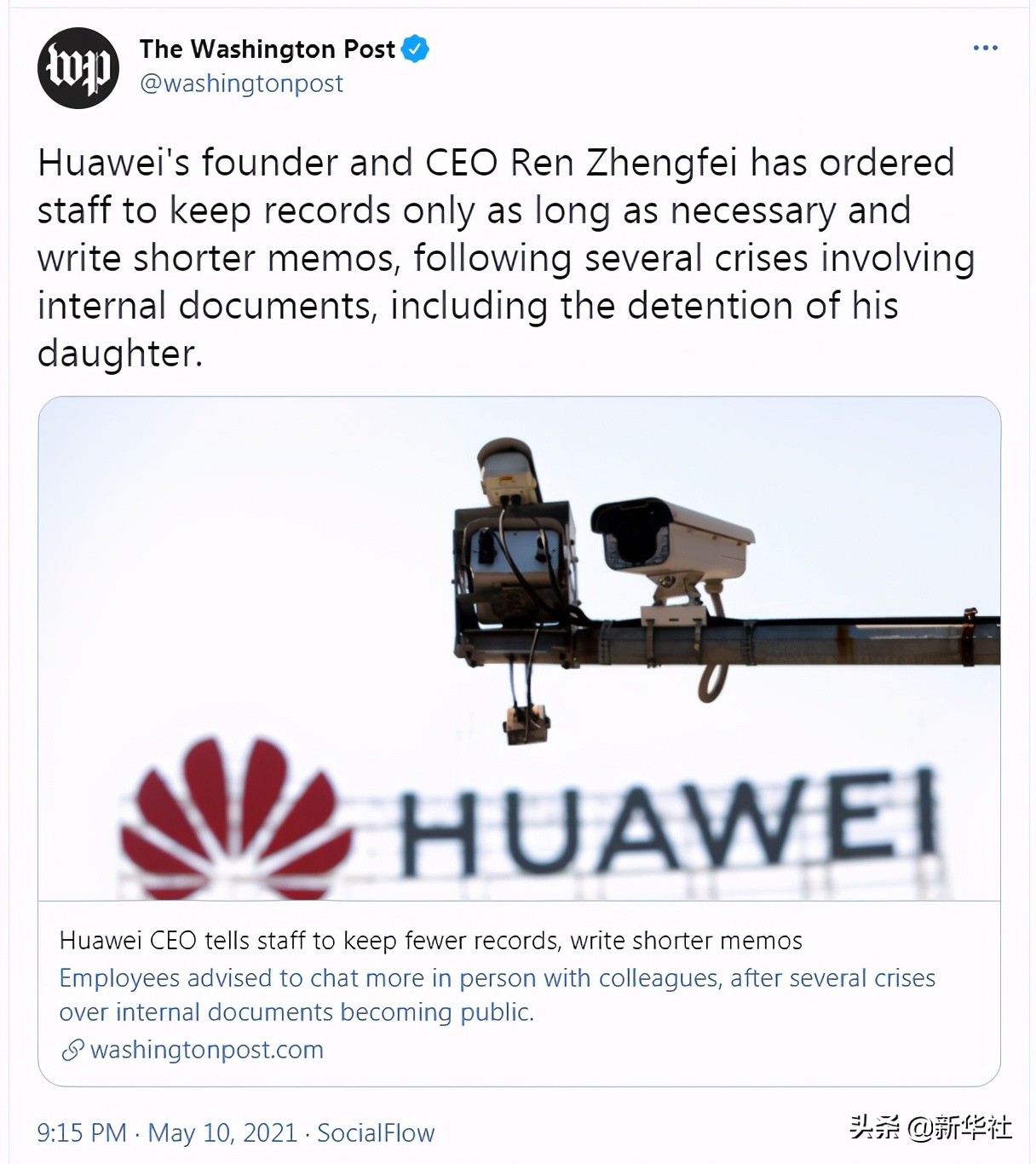Beijing, 12 May (Xinhua) -- What is the "heart" of the "Washington Post"? Xinhua News Agency reporter Wang Zichen hammered the newspaper's report on Huawei out of context and created fake news...
At 9:15 p.m. on May 10, the Washington Post tweeted the following:

After several crises involving internal documents, including the detention of his daughter, Huawei founder and CEO Ren Zhengfei has ordered employees to keep only the necessary records and write shorter memos.
After the "planting of stolen goods", the Washington Post report went on to "interpret" it by adding background:
Translation: The content of Huawei's internal documents has been important in recent crises. Ren's daughter, Meng Wanzhou, Huawei's chief financial officer, is battling being extradited from Canada to the United States, which cites a PowerPoint presentation (allegedly from within Huawei) as evidence in the case indicting her.
In this way, through a short report, the veteran media "Washington Post" in the United States "vividly" sketched the picture of Huawei's company in order to prevent internal document leakage from "repeating the same mistakes", and issued regulations to prevent it.
But what are the facts?!
The Washington Post report gives a source of "news", such as the blue font part of the picture above, after clicking on it, it is actually a link to the following "Ren Zhengfei's speech at the integrated management symposium"...
"Ren Zong's speech at the symposium of the integrated management improvement working group" only expounded the guidelines and policies of Huawei's internal management, focusing on "subtraction" and "improving organizational efficiency". The "sunset law" mentioned in it is also very clear, which is to simplify some unnecessary data preservation. As mentioned in the speech: "Who looked at the Voices community 3 years ago?" If no one does check the historical data, it means that there is no need to keep the historical data. When simplified, it's less serviced by so many people and doesn't need to take up storage space in the data center. ”
Any Chinese reader reading through huawei's speech will find that its purpose is to streamline internal workflows and improve efficiency. In layman's terms: the materials that should be retained are retained, and those that are not necessarily retained are all abolished. In the "Washington Post" report, through a certain background addition, it has become a proof that "Huawei intends to hide".
In fact, Huawei proposed the "sunset law" at least as early as 2017. If you search for "Sunset Law" in the Huawei "Voice Community" linked to in the Washington Post article, you can find a lot of similar content from Huawei in recent years, such as:
The following are the provisions of Huawei's "Sunset Law" in 2017 (searched by the "Voice of the Heart Community").
As we all know, Huawei's "Voice Community" is a rare transparency measure among global technology companies. The web forum allows internal employees to openly discuss company management, and allows users outside the company to view some of the company's internal speeches and other materials at will — have you ever seen Google, Amazon, and Apple allow this?
In addition, the reporter also searched for a 2017 "Initiative on Huawei's Email Etiquette" from Huawei's "Voice of Hearts Community"
This initiative clearly mentions that employee emails should be concise and concise, and the things that can be explained in an email should not be divided into several...
All in all, in recent years, Huawei has demanded the elimination of obsolete useless documents and to be concise in internal reports, emails, and so on. All of the above is public and can be easily found with a few simple searches.
However, it is regrettable that in the Washington Post report, it is really speechless to "turn a blind eye" to the many historical documents that Xinhua Reporters easily searched for in the same forum, and it is necessary to take Huawei's consistent work out of context and misplace the context as "news", and "graft" the measures to streamline documents and improve efficiency into the background of the so-called Huawei hiding, malicious intentions, and beware of trouble.
After the Washington Post sent the report on Twitter, Xinhua News Agency reporter Wang Zichen cited the above-mentioned Huawei Voice community content to send 15 series of tweets an hour later to refute it, and "hit the report head-on".
Wang Zichen said on Twitter: If this is not out of context, I really don't know what else can be taken out of context... The Washington Post report portrays This situation of Huawei as something new and sneaky to hide potential criminal evidence, which is really incredible.
Wang Zichen's rebuttal was reasonable and well-founded, and received praise from some netizens (even some Western mainstream media reporters and professors).
Translation: Series of tweets about Huawei – The concept of efficiency may be so foreign to them that they feel that a well-founded (internal Huawei) policy is abnormal.
Translation: Thank you to Wang Zichen for taking the trouble to uncover yet another biased report – a laborious but rarely recognized job.